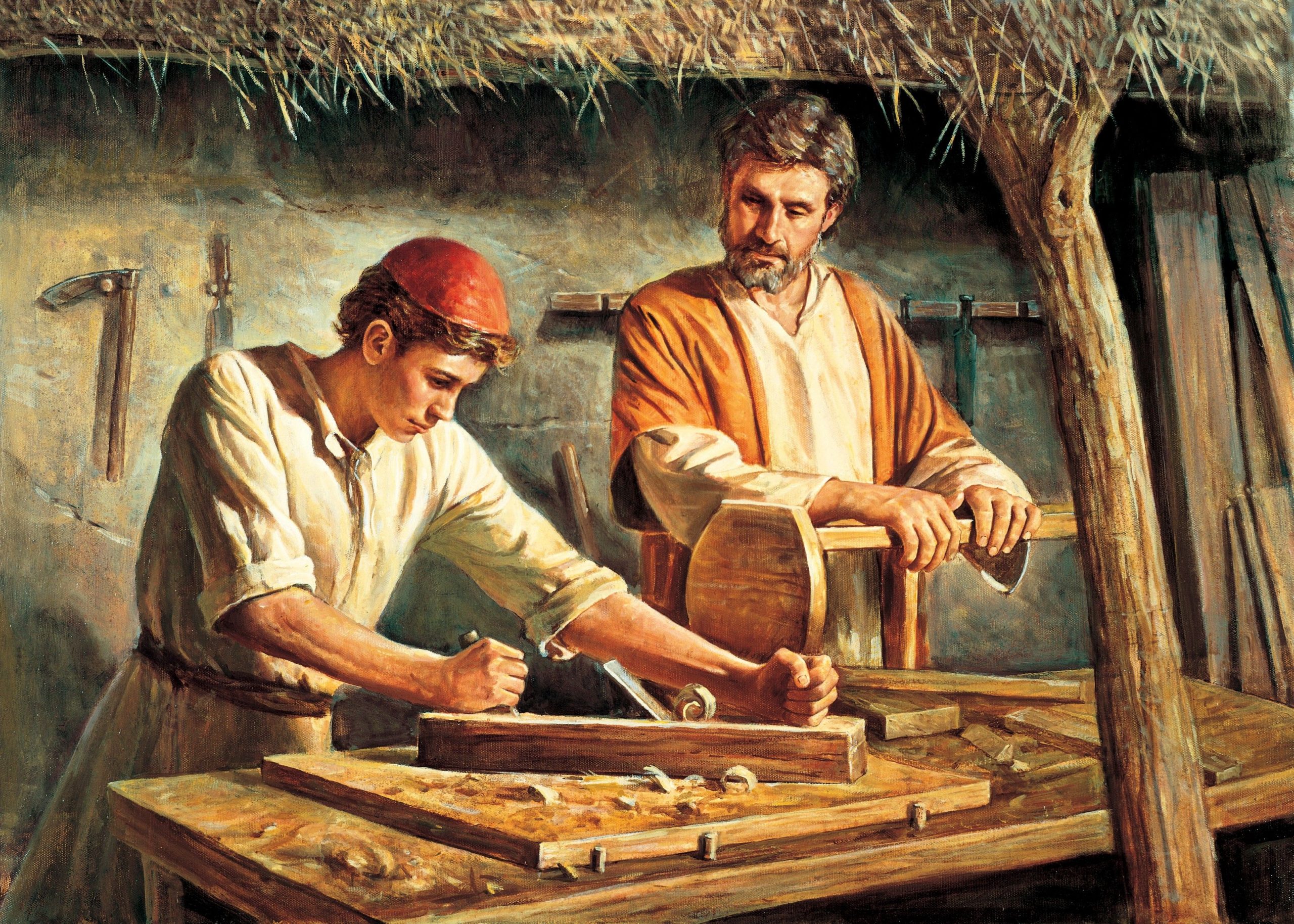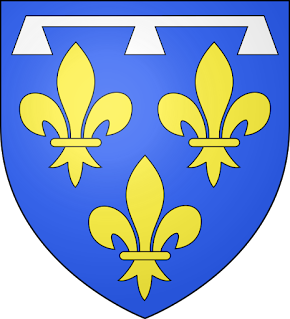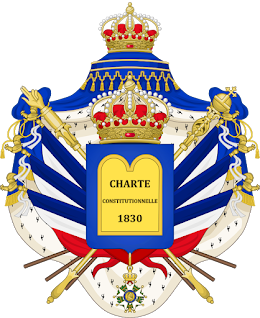Fr Zed discusses today's Feast of St Joseph the Worker, instituted to counteract the Reds' Labour Day celebrations on May Day. (This was originally published in 2022, hence the shift in days of the week.)
 |
From One Peter Five
By Fr John Zuhlsdorf
This year the 1 May observance of the 2nd Sunday after Easter gives way in honor of St. Joseph, whom we venerate among his other many roles and titles as a patron of laborers and as the “Worker.”
In contrast to what we see now in the Church, to create counterplay against the rise of Communism Popes of the early and mid-20th century invoked St. Joseph, described in this Sunday’s Gospel as a tekton, in Greek “builder” of wood and of stone, often translated at “carpenter.” Pius XI, of happy memory, in 1937 wrote: “We place the vast campaign of the Church against world communism under the standard of St. Joseph, her mighty protector.” Try to imagine that today. To counter the Communist celebration of “May Day,” in 1955 Pope Pius XII declared that same 1 May to be the Feast of St. Joseph the Worker. Try to imagine that today.
Today, there is an aggressive resurgence of forms of atheistic materialism, filtered like the aboriginal serpent’s lie-venom through the fangs of wealth redistribution and confused biology accompanied by the distracting rattles and hisses of race baiting. How has the Church lately engaged with Communist aggression? In 2018, Archbishop Marcelo Sánchez Sorondo, appointed by Francis as Chancellor of the Pontifical Academy of Sciences, said, “Right now, those who are best implementing the social doctrine of the Church are the Chinese.” I don’t imagine that the late, great Ignatius Card. Kung or the very much alive, great Joseph Card. Zen would agree. Following an agreement made between the Holy See and China, details undisclosed, there are now images of the President of the People’s Republic, also Chairman of the Chinese Communist Party, installed in increasingly sinicized Catholic churches. In recent memory, St. John Paul II worked to undermine Communism. It was not all that long ago that Pius XI wrote in Quadragesimo anno 20:
If Socialism, like all errors, contains some truth (which, moreover, the Supreme Pontiffs have never denied), it is based nevertheless on a theory of human society peculiar to itself and irreconcilable with true Christianity. Religious socialism, Christian socialism, are contradictory terms; no one can be at the same time a good Catholic and a true socialist.
Entrusting the universal Church to her great patron and defender, St. Joseph, under the title today of “the worker,” may we all take stock of our blessings and perform works of mercy for the temporally and spiritually downtrodden while offering acts of reparation especially for the sins of omission of our shepherds.
Let us turn to happier thoughts. The Gospel reading for the Feast of St. Joseph the Worker is the account from Matthew of Christ’s return to Nazareth and the people’s rejection of Him. Matthew 13 has parallels in Luke 4 and Mark 6. The Mark and Matthew accounts have one of those references which unbelievers, critics of Christianity and modernists jump on: the Lord’s “brothers,” Greek “adephoí,” which to them proves that Christ’s Blessed Mother was not after all ever-virgin. The “brethren” of Jesus are also mentioned in Matthew 12:46 and his “sisters” here in Matthew 13:55f and in Mark 6:3.
Various explanations have been offered of this seeming contradiction in Scripture to the perennial, dogmatic teaching of the Church about Mary. Firstly, while the barebones meaning of “brothers” is obviously “children of the same parent/s,” it also means other things by extension. Even in Scripture, “brothers” is used for non-biological siblings. In Gen 13:8, for example, it indicated people who belonged to the same extended group. Paul, writing to the Corinthians, spoke of the Lord’s appearance to 500 “adelphoi… brethren” (1 Cor 15:6). Another point is that the “brothers” (and “sisters”) of Jesus are never said to be the children of Mary, Mother of Jesus, but Christ is explicitly called the son of Mary, as at Cana (John 2:1) and in the Upper Room (Acts 1:14).
Furthermore, there are several Marys named in the Gospels, as in Matthew 27:56: Mary the mother of James and Joseph. Coincidently, in today’s Gospel passage in Nazareth, James and Joseph are two of the so-called brethren named. James and Joseph were very common names, as was Mary, Miriam, which causes some confusion in our reading of the Scriptures, not to mention variants of the same name. For example, English “James” is Greek “Iakobos,” Hebrew “Yaakov,” which is, therefore, also, “Jacob”: “James” and “Jacob” are really the same name.
A careful reading of Scripture reveals nothing certain about the “brethren” of the Lord. The early Church writers and Fathers, however, are of one mind on the matter. For example, St. Jerome suggested that the “brethren” were sons of Joseph from a previous marriage. So does the apocryphal, non-scriptural 2nd c. Protoevangelium of James, which provides an image of Joseph as an elderly widower, which also was to safeguard Mary’s perpetual virginity. This image of Joseph as an elderly man was for long dominant in artwork. Also, we find in the Catechism of the Catholic Church (502):
Jesus is Mary’s only Son, but her spiritual motherhood extends to all men whom indeed He came to save: ‘The Son whom she brought forth is he whom God placed as the first-born among many brethren, that is, the faithful in whose generation and formation she co-operates with a mother’s love.’
Hence, the “brothers” and “sisters” of Jesus are not biological “brothers” as in “uterine brothers,” that is, children of the same mother. They might be half-brothers by the same father, or perhaps cousins, or even members of a strongly knit, almost familial group. Christ was the only child of Mary, though through Christ we all are her children. By the way, Christ has only Mary’s DNA.
Since the name “James” has come up, and since one of the Catholic Epistles in the New Testament bears the name of “James”, and since there seem to be many men with this distinguished name in Holy Writ, let’s untangle this knot of Jameses.
Firstly, let’s consider the one called James, the “brother of Jesus.” He is also, according to St. Clement of Alexandria, called James “the Just” or “the Righteous.” He is, in addition, famously called “James the Lesser.” Why “Lesser”? “Minor”? Maybe because he was short. He appears four times in the New Testament in lists of the Apostles. This is not the James who, with John the Evangelist, was the son of Zebedee, who is “James the Greater.” James, the Just, the Lesser, the “brother of the Lord,” was the son of Alphaeus. Matthew is also called son of Alphaeus, though there is no explicit statement that they are brothers. Again, it could be two different men named Alphaeus. “Alphaeus” might be an attempt to render into Greek the name “Clopas… Cleopas,” the beginning rough “c” lining up with the rough Aramaic initial “a” or “h.” The Holy women at the Cross were Mary Magdalene, Salome (wife of Zebedee, mother of John the Evangelist and James the Greater), and Mary of Clopas (wife of Clopas, who could be Alphaeus), “the mother of James” (Mark 16:1 and Luke 24:10). Last Sunday, as it happened, the Easter Octave, the Sunday with half a dozen nicknames, was also the Feast of Sts. Mary of Clopas and Salome.
What happened to this James, the Lesser, brother of the Lord? Early Church historian Eusebius says that Peter, John and James the Greater (the inner circle within the Twelve) appointed him to lead the Church of Jerusalem and be its first bishop. In Acts 15:13-21, when the Church determined that Gentile converts did not have to be circumcised, in was James the Lesser who stated the decision that Peter ratified. Paul told the Galatians in his letter written between AD 49-58 that the only Apostle whom he met in Jerusalem was James, “the Lord’s brother” (1:19). The rest of the Apostles had spread out by then and James remained in Jerusalem. There are divided traditions about James the Lesser’s martyrdom. According the Jewish historian Josephus, James “the brother of Jesus” was stoned by the order of the Sadducee High Priest Ananus in AD 62 or 69. Early 3rd c. Hippolytus has James, “son of Alphaeus” stoned in Jerusalem and buried by the Temple.
Coincidently, I write this column about Sunday, 1 May, which way back in the day had a Roman Station church assigned, the Basilica of the Twelve Apostles. Moreover, before 1 May became the Feast of St. Joseph the Worker, it was the Feast of Sts. Philip and James the Lesser, whose remains are venerated in the old Roman Station for today, the aforementioned Basilica. The Apostles’ Feast was moved to 11 May. Their relics, translated here in 886 by a barefoot Pope Stephen IV who carried them on his shoulders from the catacombs, were hidden in the structure out of fear of desecration during invasion and only rediscovered in 1837. They are now beneath the main altar.
James the Greater, Maior, was the son of Zebedee and Salome, and brother of John the Apostles and Evangelist. Christ called them “Boanerges … Sons of Thunder” because they wanted Christ to punish a city for rejecting Him (Mark 3:17). He was, with Peter and John, in the inner circle of the Twelve. He was one of the eyewitnesses of the Transfiguration. His Feast is 25 July. James the Greater was beheaded in AD 44 at the order of King Herod Agrippa in Jerusalem (Acts 12:1-2).
Who was the author of the New Testament Letter of James? From the onset, the Letter itself says, “James, a servant of God and of the Lord Jesus Christ, to the twelve tribes in dispersion. Greeting” (v.1:1). The Letter has been attributed to James the Lesser, “brother of Jesus.”
Our early forbears in the Faith were strong in the face of evil governance and bloody persecution. Together they shepherded the early Church and nurtured its growth with great diligence and sacrifice. St. Joseph did the same in the context of the Holy Family. He was the protector of Mary and Jesus both on their way to and from Bethlehem, but also to and from Egypt when they fled from Herod the Great’s cruel assassinations. Hence, Joseph is named in the Litany approved by Pius X in 1909 as “Chaste guardian of the Virgin… Diligent protector of Christ… Protector of Holy Church.”
This Sunday we would do well to recite the Litany of St. Joseph, alone if need be, but better in a group and even better in church, as a congregation, perhaps at the conclusion of Holy Mass. Bring your hopes and petitions to St. Joseph, especially for the Church. Pray also for those who are in need of work or whose positions are becoming untenable due to the encroachment of evil ideologies and sick agendas.
St. Joseph, Terror of Demons, pray for us.










%20(2).jpg)

%20(1)%20(2)%20(2).jpg)


.jpg)


